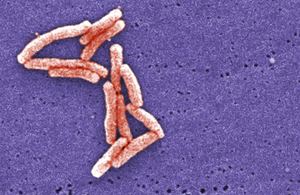Legionella contamination found in more heated birthing pools
PHE reinforces advice not to use heated birthing pools for home births after more pools test positive for Legionella.

Legionella
Latest evidence from Public Health England (PHE) about the risks from Legionella associated with heated birthing pools used at home was published yesterday (24 July 2014) in the European scientific journal [Eurosurveillance](https://www.eurosurveillance.org/content/10.2807/1560-7917.ES2014.19.29.20857.
In the article, PHE reinforces its advice not to use heated birthing pools, filled in advance of labour, for home births after 4 pools tested positive for ‘Legionella’, the bug which can cause Legionnaires’ disease.
A total of 10 heated birthing pools, sourced from several suppliers, were tested after they had been returned following the recommended recall in June 2014.
Test results are currently available for 6 of them. Of these 6, 4 tested positive for Legionella, and 3 of these also tested positive for other potentially harmful organisms, including ‘Pseudomonas aeruginosa’.
In addition to publishing the article in Eurosurveillance, PHE has also written to all known suppliers of heated birthing pools, sharing the latest test results and reinforcing the advice that they are not to be used for home births.
Professor Nick Phin, PHE’s head of Legionnaires’ disease said:
These latest results have strengthened already serious concerns about the safety of heated birthing pools in the home setting and the potential for contamination from a number of organisms which are recognised causes of infection, and pose particular risks to newborn babies.
Consequently, the PHE recommendation remains that heated birthing pools (incorporating both a re-circulation pump and heater), filled in advance of labour, should not be used for labour or birth at home.
PHE will review this recommendation if evidence is provided of a safe system for use in the home. However at this point in time, it appears unlikely that hired-out, re-used, heated pools can be made safe to use for labour or birth in the home setting.
We do not have concerns about purchased or hired pools that are filled from domestic hot water supplies at the onset of labour, provided that any pumps are used solely for pool emptying.
Louise Silverton, director for midwifery at the Royal College of Midwives, said:
Women planning birth at home using a traditional pool that is filled when the woman is in labour or using a fixed pool in an NHS unit are not affected by this alert and should not be concerned. Birthing pools in hospitals are subject to stringent infection control procedures and monitoring. Home birthing pools filled during labour come with disposable liners and are only in place for a relatively short time period, reducing the opportunity for bacterial growth.
Any women with concerns about using home birthing pools should contact their midwife or local maternity unit.
Ends
Notes to editors
- PHE has been investigating a case of Legionnaires’ disease in a baby born at home in a pre-filled, heated birthing pool. As part of this investigation, NHS England and PHE published a Patient Safety Alert (17 June 2014) advising NHS staff and mothers-to-be not to use pre-heated home birthing pools while the investigation was carried out. On 1 July 2014 PHE confirmed the advice was now definitive and issued another news release.
- This is the first reported case of Legionnaires’ disease linked to a birthing pool in England, although there have been 3 cases reported internationally some years ago.
- Legionnaire’s disease is extremely rare in childhood, with only 1 case in children aged 0 to 9 years reported in England between 1990 to 2011. The infection does not spread from person-to-person – people become infected with the bacteria through inhalation of contaminated water droplets.
- PHE is aware that around 6 companies in total in England supply these specific home birthing pools and about 60 pools were available nationally for hire at the time of the investigation.
- All known suppliers of birthing pools have been contacted and advised not to supply heated birthing pools for home births. The majority of these pools which were out on hire have been returned but it is believed that a small number may have been retained by mums-to-be despite the advice not to use them.
- Key messages:
- the majority of birthing pools used at home are filled from domestic hot water systems at the time of labour
- there are no concerns about these types of pool as long as pumps are used solely to empty the pool and not for recirculation of warm water
- this advice relates to the importance of women not labouring or giving birth in a heated birthing pool which has been filled prior to the onset of labour and where the temperature has been maintained by the use of a heater and pump
- The pools are delivered around 2 weeks before the expected delivery date, filled from the domestic hot water supply, and the temperature maintained via a pump and heater until labour and delivery. Various disinfection regimes are recommended by the companies.
- Legionella is a commonly occurring bacteria and can be found in around 10 to 20% of domestic hot water systems. Legionnaires’ disease is a severe pneumonia caused by the Legionella bacteria. There are 350 to 400 cases a year reported in England and Wales, mainly in older adults. More information about Legionnaires’ disease.
- Read the Eurosurveillance article
- PHE exists to protect and improve the nation’s health and wellbeing and reduce health inequalities. It does this through advocacy, partnerships, world-class science, knowledge and intelligence, and the delivery of specialist public health services. PHE is an operationally autonomous executive agency of the Department of Health. www.gov.uk/phe Follow us on Twitter @PHE_uk
UKHSA press office: National Infection Service
UKHSA press office, infectious diseases
61 Colindale Avenue
London
NW9 5EQ